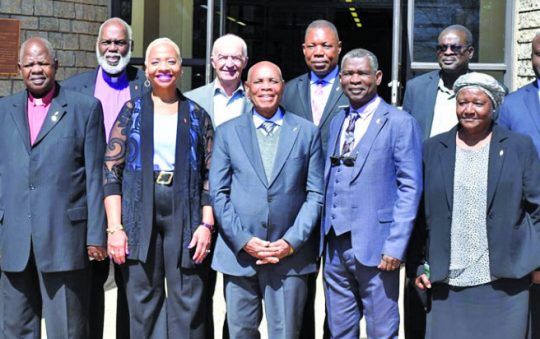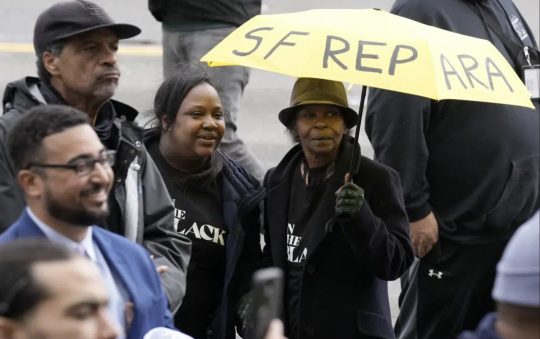
California Passes Bill Banning Discrimination Based on Hair Styles, Texture
On Aug. 27, the State Legislature passed Assembly Bill (AB) 1815, a law that bans hair-based discrimination related to race, making its way to Gov. Gavin Newsom’s desk for a final signature.
This bill seeks to expand the state’s civil rights laws to include protections based on hairstyles and hair texture such as locks, braids, and twists, and protective hairstyles that are popular among Black people. California was one of the first states to enact laws that protect people from discrimination in schools and employment under the CROWN Act in 2019. According to the Economic Policy Institute, Black women’s hairstyles are 2.5 times more likely to be perceived as unprofessional as compared to those of White women.
The CROWN Workplace Research Study revealed last year that 66% of Black women change their hair for a job interviews — most of them from curly to straight to appear more professional.
Related Stories:
https://lasentinel.net/political-playback-news-you-might-have-missed-may-2.html
https://lasentinel.net/political-playback-news-you-might-have-missed-may-30.html
AB 1815 is one of 14 reparations bills introduced by the California Legislative Black Caucus (CLBC). The bills were based on recommendations in the final report published by the California Reparations Task Force in 2023.
The task force recommended more than 100 policy proposals that promote racial justice and justify reparations.
Assemblymember Akilah Weber (D-La Mesa), the newly elected chair of the CLBC, authored AB 1815.
“We have changed a harm that has been given to people for generations that stated that beauty only occurs if you look a certain way if your hair is only a certain way,” said Weber.
“This particular bill repairs that harm.”
Weber acknowledged that AB 1815 was one of the least controversial in the 14-bill package. Although the bill was amended a few times, it faced minimal opposition from lawmakers.

California Legislature Passes Law to Protect Incarcerated Pregnant Women
The California Senate recently approved a package of bills that expand protections for pregnant women who are incarcerated. Those bills are now awaiting final approval in the Assembly before moving to Gov. Gavin Newsom for his consideration.
Among the proposed bills, is Assembly Bill (AB) 2527 law that bans pregnant women and women up to 12 weeks postpartum from being placed in solitary confinement. However, the exception is if “there is a credible and imminent threat to the safety or security” of the woman. The legislation requires that pregnant women receive daily portions of clean bottled water and meals that meet nutrition guidelines under the Special
Supplemental Nutrition Program for Women, Infants, and Children. Another bill requires pregnant women to be referred to a social worker within one week of entering prison to talk about options for parenting classes. Additionally, the bills would require postpartum mothers to stay at a medical facility as recommended by a medical provider.
State lawmakers also proposed a bill that would reduce the number of empty state prison beds by 2030. The bill was introduced as a cost-effective measure that aims to cut costs and save the state money during a tough budget year. The bill is pushing for the state to close down more prisons to push back on mass incarceration that disproportionately affects Black people.
Currently, the state has approximately 15,000 empty prison beds costing the state millions annually to maintain the beds. The proposed bills would gradually reduce the number to 2,500 beds in the next six years, paving the way to close state prisons in the future.

California Assembly Passes Sex Trafficking Bill
A bill Sen. Shannon Grove (R-Bakersfield) authored addressing sex trafficking and aiming to increase penalties for those who purchase children for sex made it out of the Assembly with a 73-0 vote one day before the final day of the Legislative session.
Senate Bill (SB) 1414, titled “Crimes: Solicitation of a minor,” would apply to defendants who are 18 years of age or older at the time of the offense. Senators Anna Caballero (D-Merced) and Susan Rubio (D-Baldwin Park) are co-authors of the bill.
“By increasing penalties for those who solicit or purchase children for sex, we are sending a clear message:
California’s children are no longer for sale,” Grove stated. “While I am disappointed in the forced amendments that excluded some minors, I am pleased with this step forward. We know there is still work to be done and I will continue to fight to protect all children.”
According to SB 1414’s language, if the person solicited for sex was under 16 years of age, or if the person solicited was under 18 years of age at the time of the offense and the person solicited was a victim of human trafficking, the offense would be punishable as a “wobbler,” meaning prosecutors can either charge the suspect with a misdemeanor or a felony.
Gov. Gavin Newsom has until Sept. 30 to sign the bill into law or veto it.
California Legislature Clears Cyberbullying Bill
On Aug. 29, the California Assembly voted to pass a bill that would require social media platforms to respond to reports of cyberbullying by either removing the content in question or explaining why it is aligned with their platform’s policies,
The bill passed on the Assembly floor with a 71-0 vote.
Titled Cyberbullying Reporting and Accountability, SB 1504,authored by Sen. Henry Stern (D-Calabasas), advanced to Gov. Gavin Newsom desk for his signature or veto.
“Cyberbullying is a deadly and growing crisis. Social media companies must do their part to respond to cyberbullying threats, like the fight pages that led up to Shaylee Mejia’s death,” Stern said in a statement to California Black Media.
Mejia, 16, died from blunt force trauma to the head, according to a Los Angeles County medical examiner who ruled her death an accident, citing that she fell down a flight of stairs. The family believes her death was caused by a fight at school that was captured on video.
SB 1504 is designed to have social media platforms such as Instagram, TikTok, Facebook, and others “respond compassionately and predictably” to reports of cyberbullying, Stern said in April.
According to the California Department of Justice (DOJ), Black and Hispanic teens are more likely than their White counterparts to be targets of cyberbullying. In addition, Black teens are about twice as likely as Hispanic or White teens to express that their race or ethnicity made them a target of online mistreatment, according to a 2002 survey by the Pew Research Center.
If signed into law, SB 1504 will not require the Attorney General on behalf of all Californians to bring enforcement actions. Instead, it allows any person who reports cyberbullying and does not receive a timely response to enforce their own rights.
“Schools, students’ and parents’ complaints about cyberbullying often fall on deaf ears with the social media giants. This bill takes the power back,” Stern stated.
U.S. DOT Awards California Nearly $150M for EV Charging and Fueling Infrastructure
The United States Department of Transportation has awarded $149.7 million to California to build its zero-emission vehicle charging and fueling infrastructure, Sen. Alex Padilla (D-Calif.) announced last week.
“Decarbonizing the transportation and goods movement sectors is essential for fighting the climate crisis and protecting public health in communities along busy corridors,” said Padilla.
The funding includes $100 million for medium and heavy-duty zero emissions vehicles. The funding is being managed by the Charging and Fueling Infrastructure Grant Program under the Federal Highway Administration (FHA).
The federal agency was created by the bipartisan infrastructure law to fund development projects. The state’s Department of Transportation will receive $102.4 million for its West Coast Truck Charging and Fueling Corridor Project. The charging and fueling stations will be developed for zero-emissions medium and heavy-duty vehicles along 2,500 miles of key freight corridors in California, Oregon, and Washington. The project aims to transport goods between major ports and freight centers and agricultural regions along the West Coast.
Several Democratic leaders urged U.S. Secretary of Transportation Pete Buttigieg to support the zero-emissions project. The Charging and Fueling Infrastructure Grant Program also aims to deploy electric vehicle charging and fueling infrastructure in publicly accessible locations to help underserved and disadvantaged communities.
“To successfully meet California’s critical climate goals, we need to scale up our charging and fueling infrastructure up and down the state through transformative projects like the West Coast Truck Charging and Fueling Corridor Project,” Padilla added.
Additional government agencies and organizations in California were awarded up to $15 million to invest in sustainable transportation infrastructure. They include the Fort Independence Indian Community, the Los Angeles County Metropolitan Transportation Authority, the San Francisco Bay Area Rapid Transit District, and the Shingle Springs Band of Miwok Indians.







